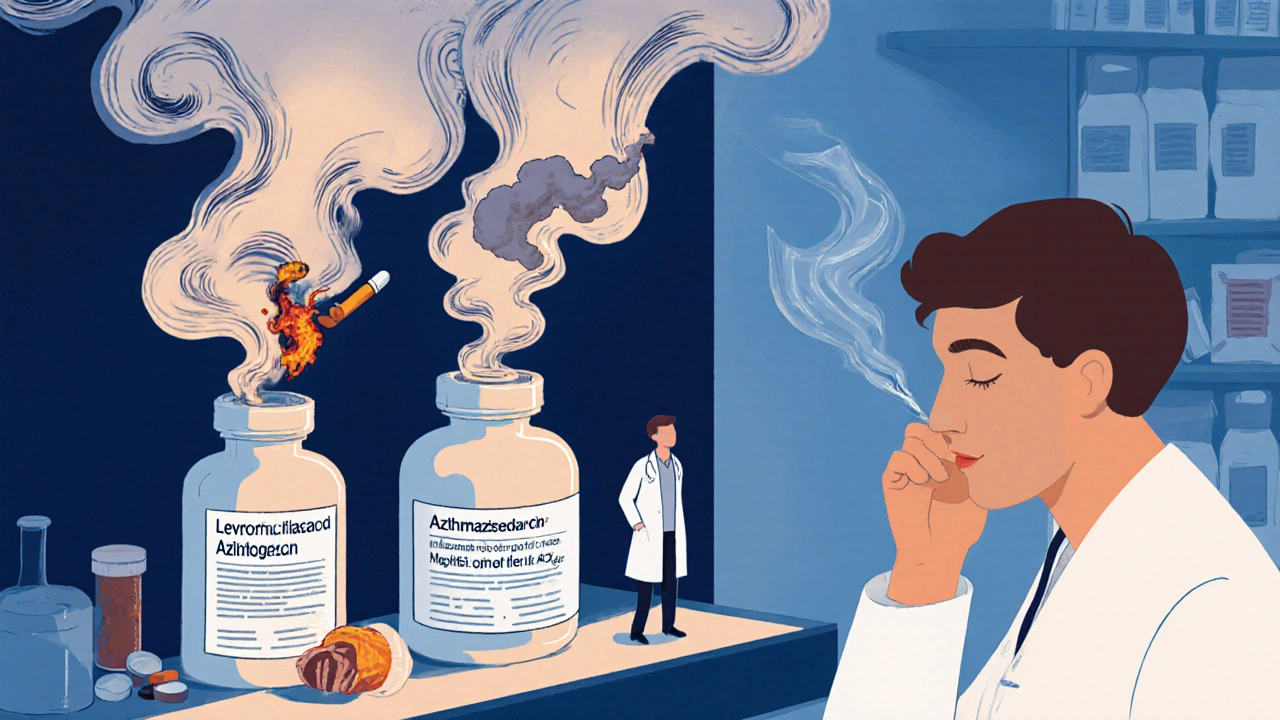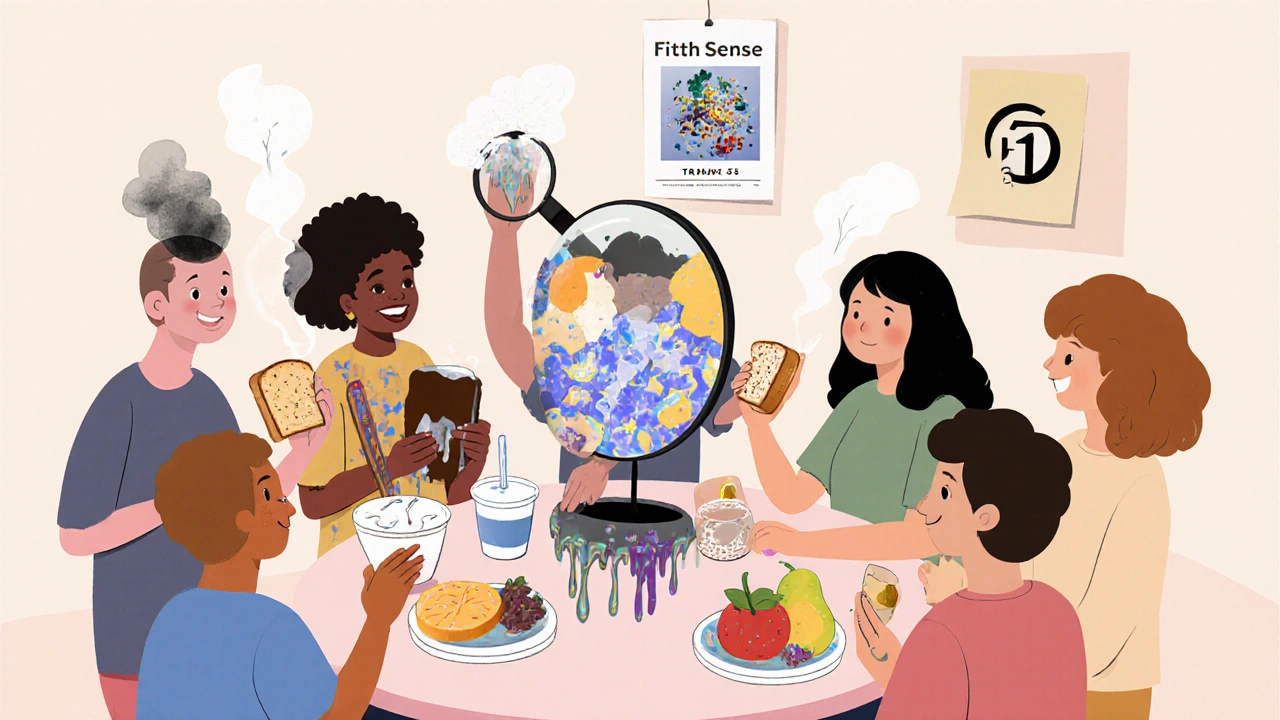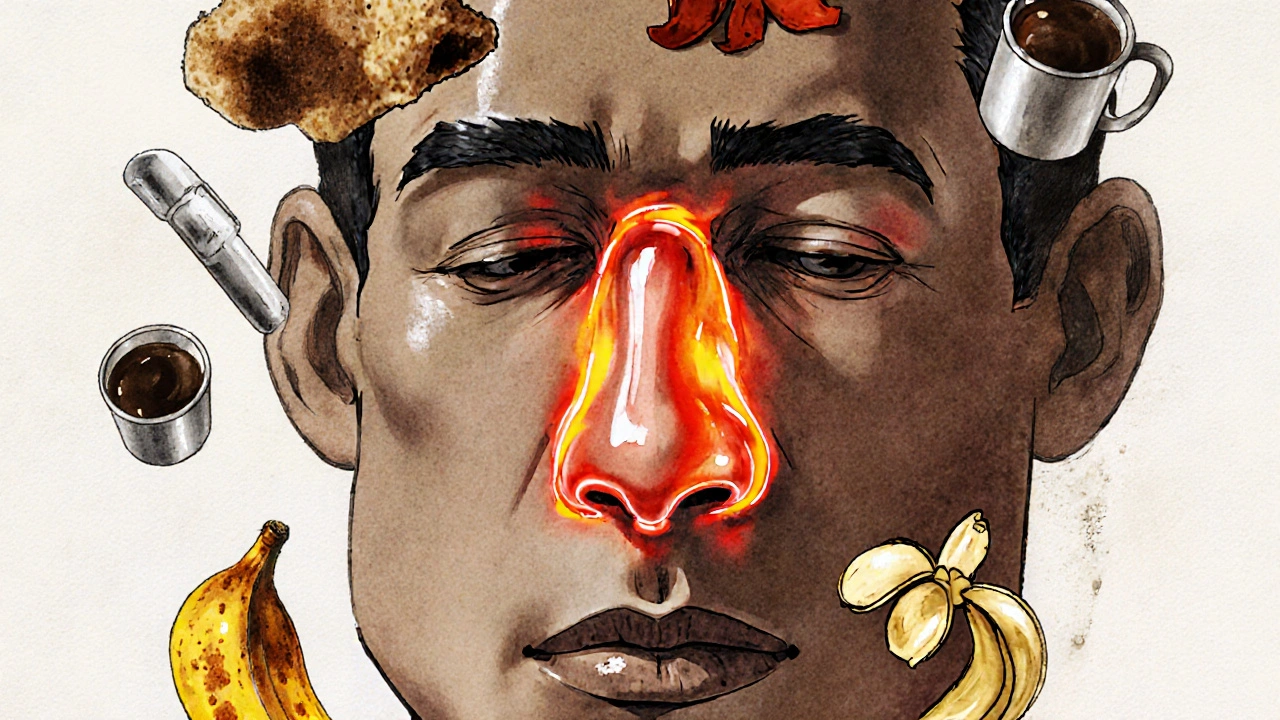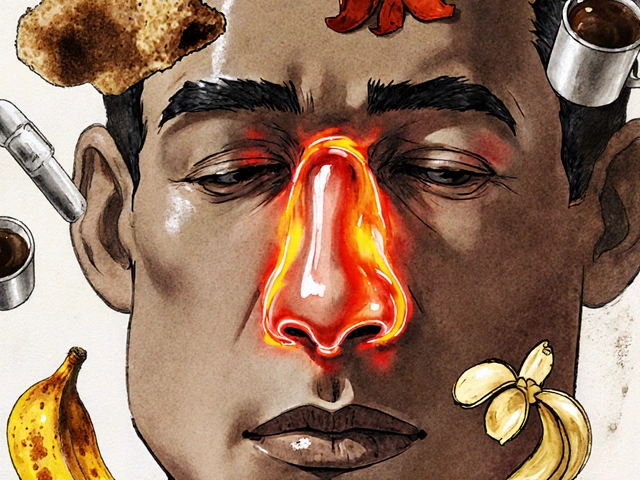Dysosmia Risk Calculator
How Your Medication Might Affect Your Smell
This tool helps identify if your current medication could be causing smell changes. Remember, never stop medications without consulting your doctor.
Important Notes
- Never stop medication without consulting your doctor
- Symptoms often improve within 3 months after stopping
- Zinc supplements may help if deficient, but can be harmful if not
- Report smell changes to your doctor immediately
Have you ever taken a medication and suddenly noticed that your favorite coffee tastes like metal, or that bread smells like rotten eggs? You’re not imagining it. This isn’t just a weird coincidence-it’s a real, documented side effect called dysosmia. It’s when your brain misreads smells, turning familiar scents into something unpleasant, or even making you smell things that aren’t there at all. And it’s more common than most doctors realize.
What Exactly Is Dysosmia?
Dysosmia isn’t just losing your sense of smell-that’s called anosmia. Dysosmia is when your nose still works, but your brain gets confused. A banana might smell like gasoline. Your own breath might smell like burnt plastic. You might catch whiffs of cigarette smoke when no one is smoking. These aren’t hallucinations in the psychiatric sense. They’re real sensory distortions caused by how certain drugs interact with your olfactory system.
The science behind this is surprisingly detailed. Your smell receptors are made of specialized cells in your nose that send signals to your brain. Some medications interfere with those signals by sticking to the receptors, blocking them, or keeping them stuck in the “on” position. Others mess with the tiny electrical channels in those cells, like TRPM5 or calcium channels, which control how signals are sent. Some drugs even change the way your body breaks down odor molecules using enzymes like cytochrome P450. The result? Your brain gets scrambled signals and tries to make sense of them-and often, it gets it wrong.
Which Medications Are Most Likely to Cause This?
Over 500 medications have been linked to smell and taste changes, according to MedLink Neurology’s 2022 update. But not all are created equal. Some carry a much higher risk than others.
Antibiotics are the biggest offenders. Fluoroquinolones like levofloxacin and moxifloxacin, and tetracyclines like doxycycline, are especially notorious. Macrolides like azithromycin and clarithromycin also rank high. These drugs don’t just kill bacteria-they can bind to zinc and magnesium in your nasal tissue, which are essential for smell cell repair. A 2022 Japanese study found that people taking levofloxacin were 2.5 times more likely to develop smell distortion than those not on the drug.
Cardiovascular drugs like midodrine (used for low blood pressure) and some blood pressure meds can trigger metallic tastes within minutes of IV administration. Endocrine drugs like carbimazole (for thyroid issues) and tolbutamide (a diabetes drug) are also on the list. Then there are neurological medications like carbamazepine (for seizures) and baclofen (for muscle spasms). Carbamazepine, in particular, has been linked to total loss of taste in some cases.
Even over-the-counter drugs can cause this. Nasal sprays with zinc, certain antihistamines, and even some supplements have been reported to trigger dysosmia. The route matters too-IV drugs like lidocaine or iron infusions can cause instant metallic tastes because they hit your bloodstream directly, bypassing your digestive system.
How It Affects Your Life
Most people don’t realize how much smell affects daily life until it’s gone-or broken. Smell is tied directly to appetite, memory, safety, and emotional well-being.
One patient, a 68-year-old woman, started taking levofloxacin for a urinary infection. Within 10 days, everything she ate tasted like bile. She lost 8 pounds in three weeks because she couldn’t stomach food. Her doctor assumed it was stress or aging. It wasn’t until she mentioned the smell change that the real cause came to light.
Reddit communities like r/anosmia have hundreds of posts from people describing the same thing: food tasting like garbage, constant phantom smoke, or the unbearable smell of rotting meat when walking past a bakery. One user lost 15% of their body weight over four months after taking azithromycin. Another couldn’t smell gas leaks or spoiled milk-putting them at serious risk.
Studies show up to 30% of people with medication-induced dysosmia lose significant weight. Depression and anxiety are common, too. If you can’t smell your child’s hair, your partner’s perfume, or fresh rain, it chips away at your sense of connection to the world.

Why Doctors Often Miss It
Here’s the problem: most doctors don’t ask about smell. A 2022 JAMA Internal Medicine survey found only 37% of primary care doctors routinely check for smell changes when reviewing medications. Even in specialist offices, it’s often an afterthought.
Dr. Devyani Lal from the University of Arizona says, “Patients rarely volunteer this information because they think it’s normal or they don’t know it’s connected to their meds.” And when they do mention it, doctors often jump to neurological causes-brain tumors, Parkinson’s, Alzheimer’s-when the real culprit is a simple antibiotic they prescribed last week.
There’s also no formal reporting system for smell changes in most countries. Unlike rashes or nausea, dysosmia isn’t tracked in pharmacovigilance databases. That means the true scale of the problem is hidden. The FDA recognized this in 2021, urging drug makers to include smell and taste as endpoints in clinical trials-but progress has been slow.
What You Can Do
If you notice a sudden change in smell or taste after starting a new medication, don’t ignore it. Track it. Note when it started, what you’re smelling or tasting differently, and whether it’s getting worse.
Don’t stop your medication on your own-but do talk to your doctor. Bring up the possibility of dysosmia. Mention the drug name and how long you’ve been taking it. Many cases resolve within weeks after stopping the drug. According to a 1995 study by Schiffman and Nagle, 78% of patients see improvement within three months of discontinuation.
Some drugs have alternatives. If you’re on azithromycin and develop dysosmia, your doctor might switch you to amoxicillin. If you’re on levofloxacin, ciprofloxacin might be an option (though it carries similar risks). For patients on carbamazepine, lamotrigine may be a safer alternative for seizure control.
There’s no magic pill to fix it. Zinc supplements are often suggested, but Dr. Thomas Hummel from Dresden warns they’re not a cure-all. Zinc deficiency can cause smell loss, but taking extra zinc when you’re not deficient can lead to copper deficiency, nerve damage, or anemia. The same goes for theophylline or magnesium-these aren’t proven for everyone.
One rare but promising case involved mirtazapine, an antidepressant. A patient with persistent metallic taste after antibiotics saw full recovery within five days of starting 15mg at bedtime. It’s not a standard treatment, but it shows the brain can sometimes be “reset” with the right drug.
Testing and Diagnosis
If your doctor takes this seriously, they might refer you to an ENT specialist who uses the University of Pennsylvania Smell Identification Test (UPSIT). It’s a 40-item scratch-and-sniff test that measures your ability to identify common odors like orange, leather, or cinnamon. It’s not perfect, but it’s the gold standard.
Some clinics now use electronic “e-noses”-devices that detect chemical patterns in air-but these are still mostly research tools. The real diagnostic tool is your story: when did it start? What changed? What meds did you begin around that time?

What’s Next for This Issue?
Things are slowly changing. In 2023, the Global Chemosensory Research Consortium launched a registry with over 1,200 patients from 14 countries. The European Medicines Agency plans to require smell and taste assessments in all Phase III trials for antibiotics and heart drugs starting in 2024. That’s a big deal-it means drug makers will have to prove their meds don’t wreck your sense of smell before they get approved.
Pharmaceutical companies are paying attention too. AstraZeneca filed a patent in 2022 for compounds designed to treat drug-induced smell disorders. Clinical trials are now testing drugs that target TRPM5 channels-those tiny sensors in your taste and smell cells that get hijacked by antibiotics.
And research funding is growing. The NIH allocated $4.7 million in 2023 specifically to study medication-induced smell loss. That’s a signal: this isn’t just a nuisance. It’s a public health issue.
When to Be Concerned
While most cases are harmless and temporary, dysosmia can sometimes be the first sign of something more serious. If you have:
- Loss of smell without any recent medication change
- Weakness, numbness, or vision changes along with smell loss
- Headaches, dizziness, or confusion
…then see a doctor immediately. These could be signs of a neurological condition like a brain tumor, multiple sclerosis, or early Parkinson’s. Don’t assume it’s just the meds-but don’t assume it’s not, either.
Support and Resources
You’re not alone. The nonprofit Fifth Sense (founded in 2012) runs monthly virtual support groups for people with medication-induced smell disorders. Over 150 people join each session to share stories, coping tips, and advice on talking to doctors.
The Smell and Taste Treatment and Research Foundation also offers a directory of specialists who understand this condition. Most insurance plans cover these visits if you have a referral from your primary doctor.
And if you’re struggling with food, try this: eat cold or room-temperature meals. Cold food often smells less intense. Avoid strong spices or fatty foods-they tend to trigger the worst distortions. Stick to bland, simple flavors like rice, toast, boiled potatoes, or plain yogurt until your senses stabilize.
Remember: this isn’t in your head. It’s not weakness. It’s a biological reaction to a drug. And it’s fixable-in most cases.
Can antibiotics permanently damage my sense of smell?
In most cases, no. About 78% of people recover their normal sense of smell within three months after stopping the antibiotic. But 22% experience symptoms that last longer-sometimes over a year. The risk of permanent damage is low, but not zero. If symptoms persist beyond six months, see a specialist. Early intervention improves outcomes.
Is zinc supplementation helpful for medication-induced dysosmia?
It depends. Zinc is essential for smell cell regeneration, and deficiency can cause smell loss. But if you’re not deficient, taking extra zinc won’t help-and it might hurt. High doses can cause copper deficiency, nausea, or nerve damage. Only take zinc if your doctor confirms low levels with a blood test. Don’t self-treat.
Why do some people get dysosmia and others don’t?
We don’t fully know yet. Genetics likely play a role-some people have receptors that bind more tightly to certain drugs. Age matters too; older adults are more vulnerable. Underlying conditions like diabetes or chronic sinusitis may increase risk. But there’s no reliable way to predict who will be affected. That’s why it’s so important to report any smell changes, no matter how minor they seem.
Can I still take my medication if I have dysosmia?
It depends on why you’re taking it. For life-saving drugs like blood pressure meds or antibiotics for serious infections, stopping isn’t always safe. Talk to your doctor about alternatives. For less critical meds-like some antidepressants or allergy pills-switching may be possible. Never stop a prescription without medical advice, even if the side effect feels annoying.
Are there any new treatments on the horizon?
Yes. Phase II clinical trials are testing drugs that block TRPM5 channels, which are hijacked by antibiotics to cause metallic tastes. Early results show promise in reducing distortion without affecting normal smell. Other researchers are exploring nasal sprays that deliver neuroprotective agents directly to the olfactory tissue. These aren’t available yet, but they represent the next big step in treatment.



Comments
Wow, I had no idea this was so common. I took azithromycin last year and everything tasted like ash for weeks. My mom thought I was being dramatic until I told her I couldn’t smell my own shampoo. It’s wild how something so small can wreck your whole day.
So glad this is getting more attention. Doctors need to start asking about smell like they do about nausea or dizziness.
Levofloxacin caused this for me. Three days in. Metallic. All. The. Time.
Of course you guys are surprised. You live in a country where people think ‘I lost my sense of smell’ is just ‘getting old.’ In India, we’ve known for decades that antibiotics mess with your nose. My uncle took cipro and smelled burning rubber for six months. No one cared. No one even asked. You think this is new? It’s not. You’re just now noticing because you have Reddit.
Also, zinc supplements? Please. You’re not fixing biology with a Walmart pill. Stop pretending.
Let me just say this: your sense of smell is your soul’s GPS. When it breaks, you don’t just lose the smell of rain or bread-you lose the memory of your mother’s kitchen, the warmth of your partner’s neck, the quiet comfort of a forest after rain.
This isn’t a side effect. It’s a spiritual violation. And the medical industrial complex? They’d rather sell you another pill than admit they poisoned your perception.
I’m not mad. I’m just… profoundly sad. And I’m not alone.
Had this with doxycycline back in ’21. Smelled like burnt toast 24/7. Ended up eating nothing but plain rice and boiled eggs for a month. My cat started avoiding me because I smelled like a toaster oven.
Switched to amoxicillin and it faded over six weeks. No magic cure, just time. But man, it sucked. I didn’t realize how much I relied on smell until it was gone.
Thanks for writing this. I’ve been too scared to talk about it because people think I’m crazy when I say my coffee tastes like copper. But it’s real. And it’s not just me.
My doctor brushed it off as ‘stress’ until I printed out that JAMA study. Then he actually listened. Turns out my blood pressure med was the culprit. We switched it and boom-smell came back in 3 weeks.
Don’t be quiet about this. Your voice matters.
okay so i took carbamazepine for like 6 months and i swear i started smelling smoke all the time like even when no one was smoking and i thought i was going crazy but then i read this and i was like ohhhhhhhh so its not me its the drug???
also i lost like 10lbs because i couldnt eat anything without gagging. my partner had to feed me like a baby. its so weird how your brain just flips a switch like that.
now im on lamotrigine and its 100x better. still a little weird sometimes but not like ‘i just stepped into a landfill’ weird.
pls tell your doc. they dont know this stuff.
My mom had this after her antibiotics for pneumonia. She stopped eating, stopped bathing, stopped hugging people. She said she smelled death everywhere. It wasn’t depression. It was the medicine.
She didn’t tell anyone for months because she thought it was her fault. I wish someone had told us this sooner.
Thank you for writing this. It’s not just a side effect. It’s a trauma.
As someone from India, I have seen this phenomenon in my family and community for years. In rural areas, antibiotics are often taken without medical supervision, and smell distortion is dismissed as ‘nervousness’ or ‘weak constitution.’
It is heartening to see formal research catching up. The cultural stigma around sensory issues must be addressed alongside medical education. Patients must be empowered to speak up, and doctors must be trained to listen.
Also, the mention of TRPM5 channels is promising. Science is finally looking at the olfactory system not as a footnote, but as a vital sensor of human experience.
Interesting that you frame this as a ‘public health issue’ while ignoring the fact that pharmaceutical companies have known about this for decades and deliberately suppressed data to avoid regulatory scrutiny.
You mention AstraZeneca’s patent-but you don’t ask why it took 20 years of patient suffering for them to even consider a solution. You praise the NIH funding, yet ignore that the same agency funded the original trials that ignored smell endpoints entirely.
This isn’t a breakthrough. It’s damage control. And until the system stops treating patients as collateral, no amount of ‘registry’ or ‘trial requirement’ will fix the moral rot at the core of this.